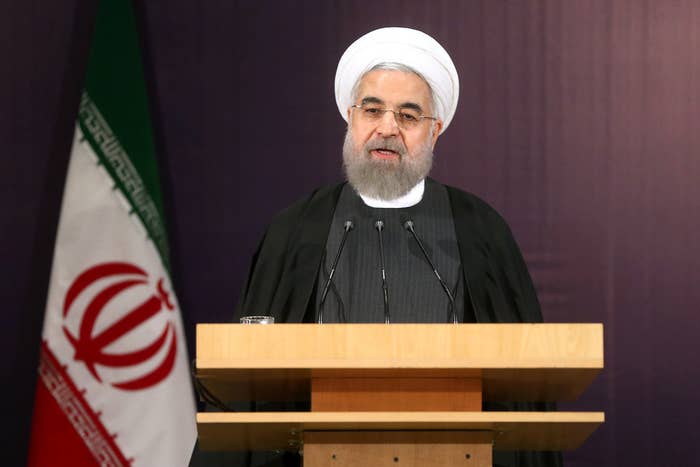
Iran's President Hassan Rouhani signed up Monday to run for a seat on the obscure panel that oversees the country's top spiritual and political authority, intensifying competition ahead of February elections for both the oversight council and parliament.
Hassan Khomeini, the grandson of the ayatollah who founded the Islamic Republic 37 years ago, also announced he was running for the 86-member Assembly of Experts, as did the once-powerful cleric Ayatollah Ali Akbar Hashemi Rafsanjani, who sought to open Iran economically during his 1989 to 1997 presidency. All three are allied with the relatively moderate reformist faction within the Iranian political establishment.
Iran's complicated political system has numerous checks and balances and many of the trappings of a modern democracy. But it largely remains a theocracy with Supreme Leader Ali Khamenei firmly at the helm and only tried-and-true Islamists loyal to him able to take part in the political system. Rouhani and other like-minded moderates have tried to reform the Iranian system to increase domestic freedoms, improve the economy, and patch up relations with the outside world damaged by Iran's ideologically driven firebrand rhetoric and policies.
By running as a candidate for the assembly Rouhani, who won the presidency in 2013 in an upset over a field of hardliners, will try to use his own personal popularity to draw voters to the polls on Feb. 26, in an off-year legislative election that is crucially important in his attempt to pursue his agenda.
But the vote for the Assembly of Experts, who are up for election only once every eight years, is almost more important. In theory, the panel of religious experts has oversight powers over the office of the supreme leader; in practice it has little power. But once the 76-year-old Khamenei passes away, the Assembly of Experts has the crucial role of deciding on his successor.
Rafsanjani has floated the idea of replacing the supreme leader with a council of religious scholars, effectively diluting the office's authoritarian tendencies.

Iranians have repeatedly tried to bring about change via the ballot box; evidence of widespread fraud in 2009 ignited months of protests known as the Green Movement throughout the country. Rouhani sought to assure voters that his government, which will oversee the February vote, won't tolerate any cheating.
"If, God forbid, there are any irregularities in the process of the conduct [of elections], the government will give a harsh response," Rouhani said in a speech urging Iranians, especially women, to vote and to run as candidates in the upcoming elections.
But the moderates will face many obstacles. First among them is the Guardian Council, a panel appointed by Khamenei and parliament that vets candidates for national public office. In the past it has disqualified moderate candidates for parliament and squashed their appeals. In his comments on Monday, Rouhani seemed to be calling on them to be fair.
"The government seeks to hold healthy and glorious elections with maximum turnout and competition in coordination and cooperation with the Guardian Council," he said. "Our country has laws and the Guardian Council will undoubtedly act based on the law."
Even if the moderates manage to garner a surprise Assembly of Experts election victory, the country's security establishment, steadfastly loyal to Khamenei and firmly in the camp of the hardliners, remain an impediment to change. Recently Maj. Gen. Hassan Firuozabadi entered the political fray by vehemently opposing any attempt to "break up" the powers of the supreme leader, who is also commander-in-chief of Iran's military.
"Listen well, people, for the key to breaking the solid internal power of Iran is through the term 'council,'" he told the Fars News Agency. "Throughout history, we have never had a council of imams or a council of commanders-in-chief of the armed forces. Even if the impossible happens and a council takes over the position of the supreme leader then there will be too many voices and this will break the solidarity of our unity against America, Zionists, and arrogant and reactionary enemies."
